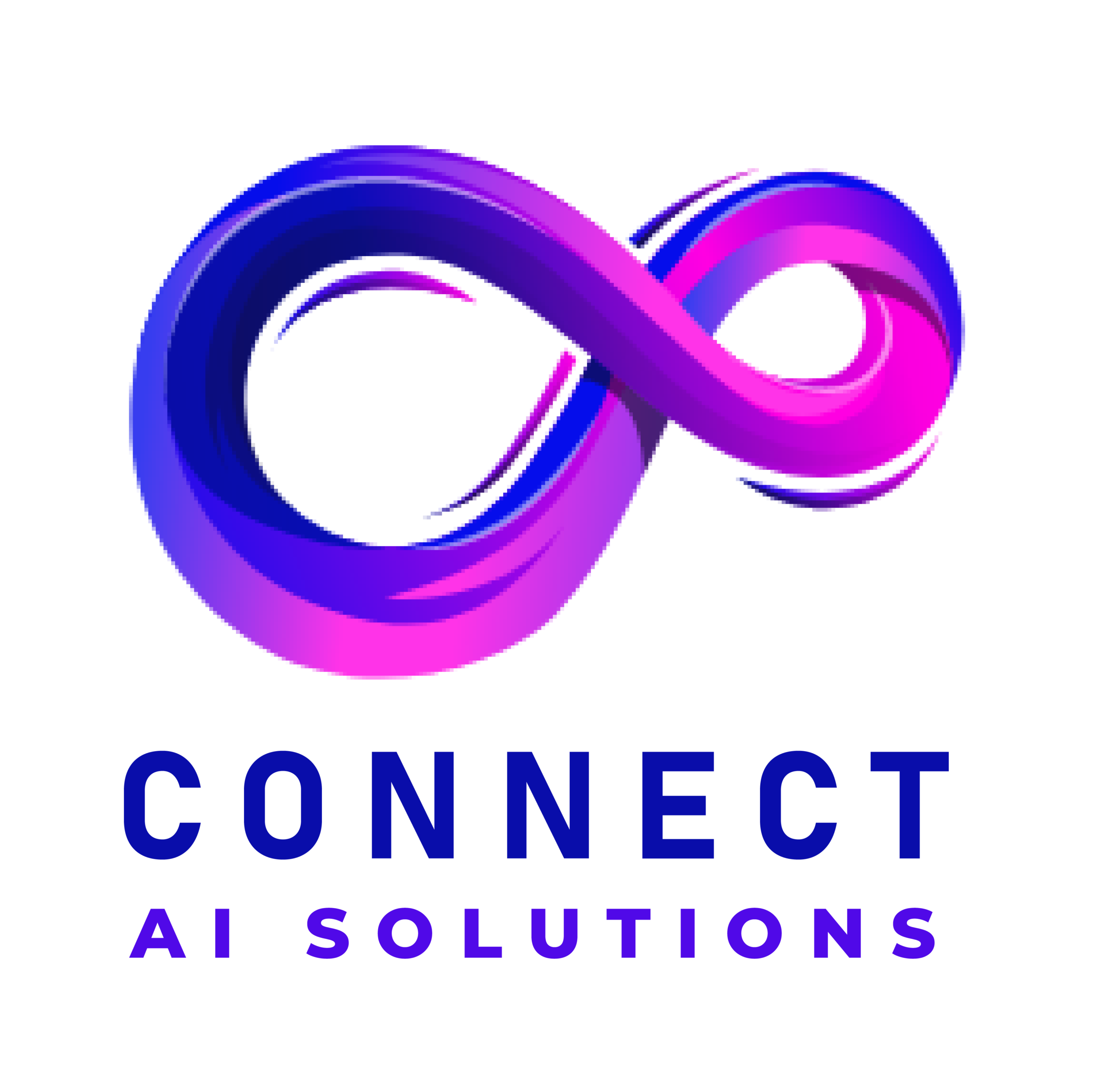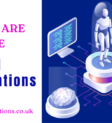Applications of AI: How Artificial Intelligence is Transforming Industries
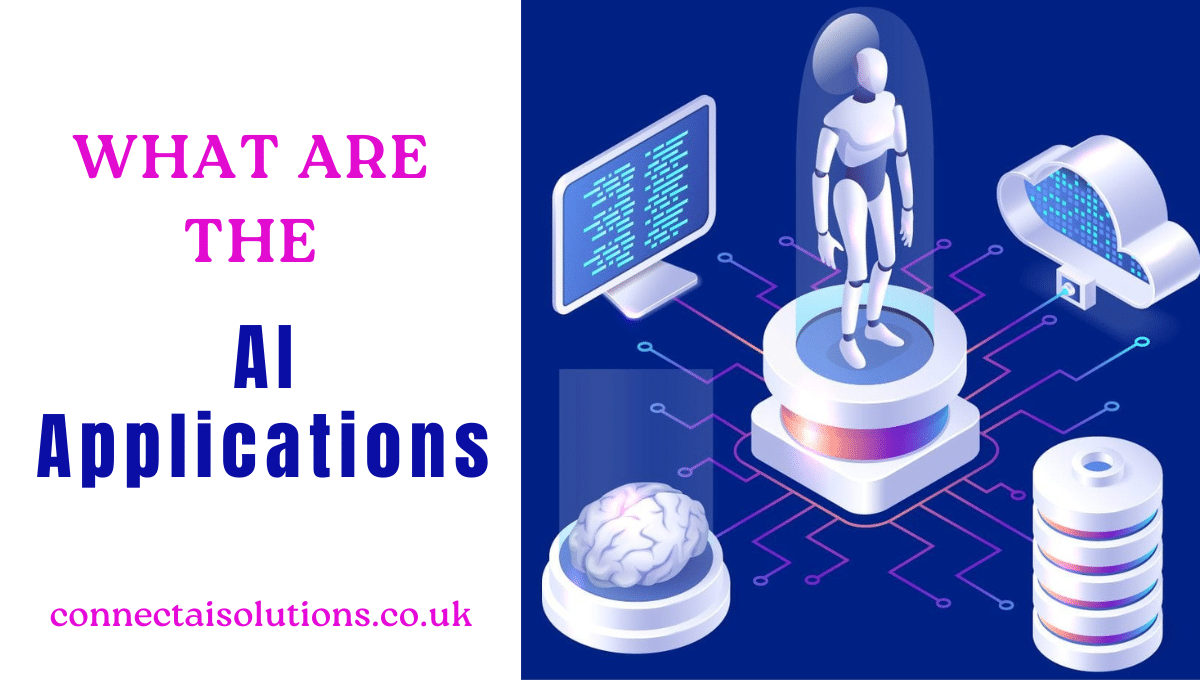
Artificial Intelligence (AI) is used in many areas of our daily lives and industries. In this article, we will explore the various applications of AI and how they are shaping the future. From helping doctors diagnose diseases to making online shopping more personalized, AI is making tasks easier, faster, and more efficient.
Businesses use AI to improve customer service, detect fraud, and automate processes, while schools use it to create better learning experiences. AI also transforms transportation, manufacturing, and even farming by making operations smarter and more effective.
What are the Applications of AI: How Artificial Intelligence is Transforming Industries
Artificial Intelligence (AI) is revolutionizing various industries, automating processes, and enhancing decision-making capabilities. Applications of AI are reshaping how businesses and individuals operate from healthcare to finance. In this article, we will explore the key applications of AI across different sectors.
Applications of AI – Complete details:
Here are the various applications of AI depending upon the need and characteristics. So let us discuss them in the complete details.
1. AI in Healthcare

Ai in Helath is the most common from the Applications of AI nowadays. AI is playing a critical role in healthcare by improving diagnostics, patient care, and operational efficiency.
- Medical Imaging & Diagnostics: AI-powered tools like IBM Watson Health and Google DeepMind analyze medical images to detect diseases such as cancer, neurological disorders, and cardiovascular conditions with high accuracy. These tools assist radiologists by highlighting potential issues, reducing diagnostic errors, and accelerating the diagnostic process.
- Personalized Medicine: Machine learning models help tailor treatments based on an individual’s genetic makeup, lifestyle, and medical history. AI enables precision medicine, ensuring that treatments are more effective and reducing the risk of adverse reactions.
- Virtual Health Assistants: AI-driven chatbots and voice assistants provide instant medical advice, answer health-related queries, and help schedule doctor appointments. These virtual assistants can reduce the burden on healthcare professionals and enhance patient engagement.
- Drug Discovery: AI accelerates the process of drug development by analyzing complex datasets to identify potential compounds. AI-driven simulations predict how drugs will interact with the human body, significantly cutting down research time and costs.
- Remote Patient Monitoring: Wearable AI-powered devices track vital signs, such as heart rate and blood pressure, and alert healthcare providers to potential health risks, enabling early intervention and reducing hospital visits.
2. AI in Finance
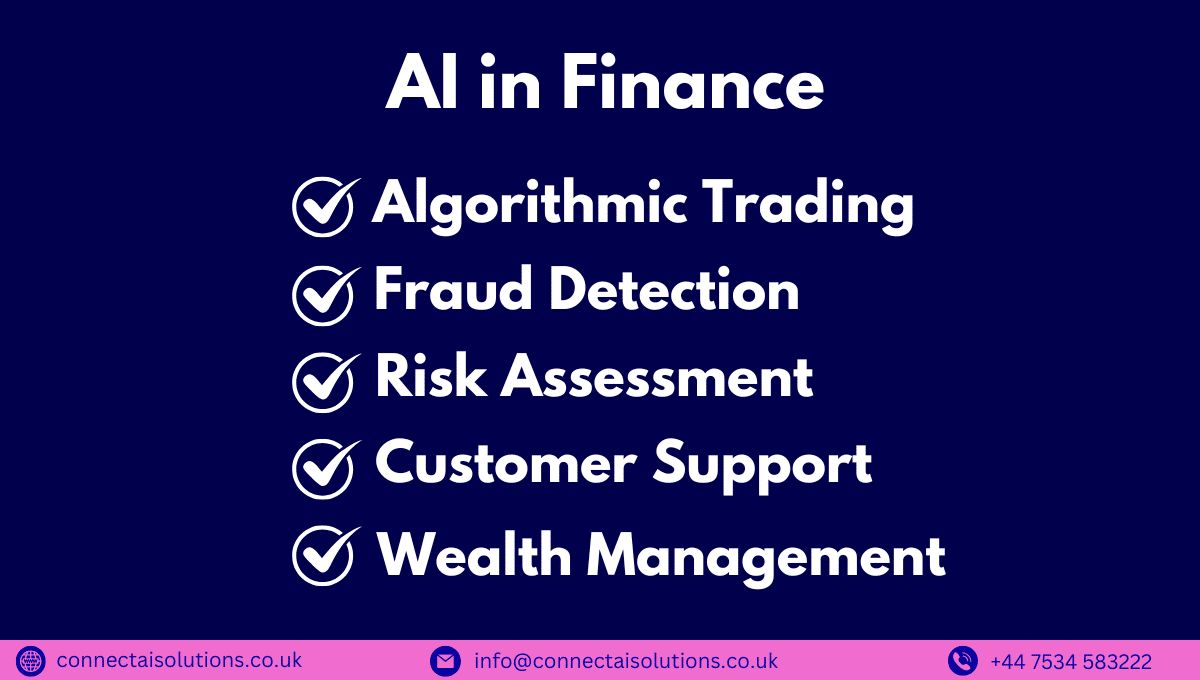
The financial sector benefits from AI-driven automation, fraud detection, and enhanced decision-making capabilities. this is the considerable application from the applications of AI.
- Algorithmic Trading: AI-powered trading bots analyze vast amounts of market data, detect trends, and execute trades in real time, improving investment strategies and maximizing profits.
- Fraud Detection: Machine learning models analyze transaction data to detect fraudulent activities. By identifying unusual spending patterns and behaviors, AI helps financial institutions prevent cyber fraud and identity theft.
- Risk Assessment: AI evaluates credit scores, assesses loan risks, and predicts market trends, helping banks and financial institutions make informed decisions on lending and investments.
- Customer Support: AI-powered chatbots and virtual assistants handle customer queries, process transactions, and provide financial advice, improving customer service while reducing operational costs.
- Wealth Management: AI-driven robo-advisors provide personalized financial planning and investment recommendations based on individual goals and risk tolerance.
3. AI in Retail & E-commerce
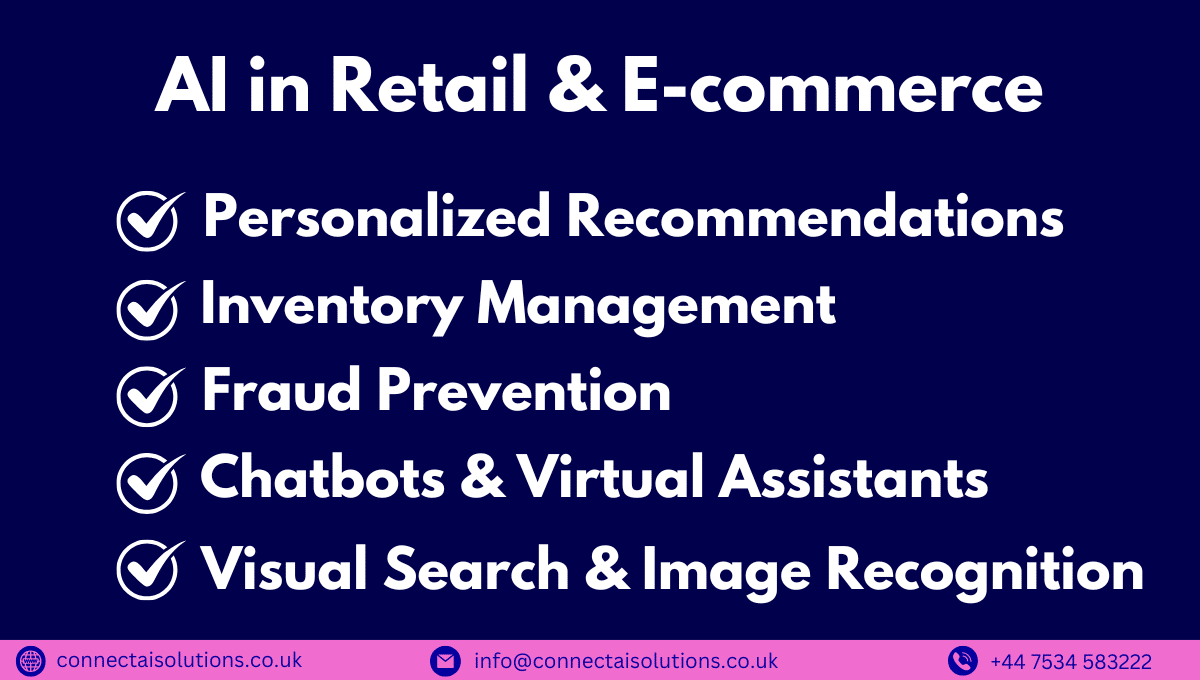
Retailers use these applications of AI to improve customer experience, manage inventory, and increase sales.
- Personalized Recommendations: AI suggests products based on what customers like and buy, making shopping easier and more enjoyable.
- Inventory Management: The applications of AI helps stores keep the right amount of stock, reducing waste and keeping shelves full.
- Chatbots & Virtual Assistants: AI-powered chatbots answer customer questions, help with orders, and make shopping smoother.
- Fraud Prevention: AI detects unusual payments to stop fraud and keep online shopping safe.
- Visual Search & Image Recognition: The applications of AI allows customers to search for products using pictures instead of words, making it easier to find what they need.
4. AI in Education

AI is transforming the education sector by providing personalized learning experiences and automating administrative tasks.
- Adaptive Learning: AI-powered platforms adjust content based on a student’s progress, learning style, and weaknesses, ensuring a customized and effective learning experience.
- Automated Grading: AI systems evaluate assignments, quizzes, and exams, reducing the workload on educators and providing instant feedback to students.
- Virtual Tutors: AI chatbots and voice assistants act as personal tutors, answering students’ queries, explaining concepts, and helping with homework.
- Predictive Analytics: AI helps educational institutions identify students at risk of dropping out, allowing early interventions and tailored support programs.
- Content Creation & Enhancement: AI assists educators in developing interactive learning materials, summarizing textbooks, and generating quizzes to improve student engagement.
5. AI in Manufacturing

The manufacturing industry benefits from AI by improving efficiency, reducing costs, and enhancing product quality.
- Predictive Maintenance: AI-powered sensors monitor equipment health, predict failures, and schedule maintenance, minimizing downtime and repair costs.
- Quality Control: AI-powered vision systems detect defects in products, ensuring high-quality manufacturing standards and reducing waste.
- Supply Chain Optimization: AI predicts demand fluctuations, optimizes inventory levels, and improves logistics planning, enhancing operational efficiency.
- Robotics & Automation: AI-driven robots perform repetitive and complex tasks, such as assembly line operations, welding, and packaging, increasing productivity and workplace safety.
- Energy Management: AI analyzes energy consumption patterns and suggests optimizations, reducing operational costs and environmental impact.
6. AI in Transportation & Logistics

AI is revolutionizing transportation by enhancing safety, optimizing routes, and enabling autonomous vehicles.
- Autonomous Vehicles: AI powers self-driving cars, trucks, and drones, reducing human errors and improving road safety.
- Traffic Management: AI analyzes traffic patterns, detects congestion, and suggests optimal routes to reduce travel time and fuel consumption.
- Fleet Management: AI helps logistics companies track vehicles, monitor fuel usage, and optimize delivery routes, improving efficiency and reducing costs.
- Predictive Analytics: AI forecasts demand for transportation services, enabling companies to allocate resources efficiently and minimize delays.
- AI-Assisted Navigation: AI enhances GPS navigation systems by providing real-time traffic updates and predicting road conditions.
7. AI in Customer Service

AI-driven automation enhances customer interactions and support services.
- Chatbots & Virtual Assistants: AI-powered chatbots handle customer inquiries 24/7, providing instant responses and reducing wait times.
- Sentiment Analysis: AI analyzes customer feedback, social media comments, and reviews to measure brand sentiment and improve service quality.
- Call Center Optimization: AI assists human agents by providing real-time insights, call transcription, and automated responses, improving service efficiency.
- Voice Recognition: AI-powered voice assistants understand and respond to customer queries, enabling hands-free interaction and improved accessibility.
8. AI in Cybersecurity
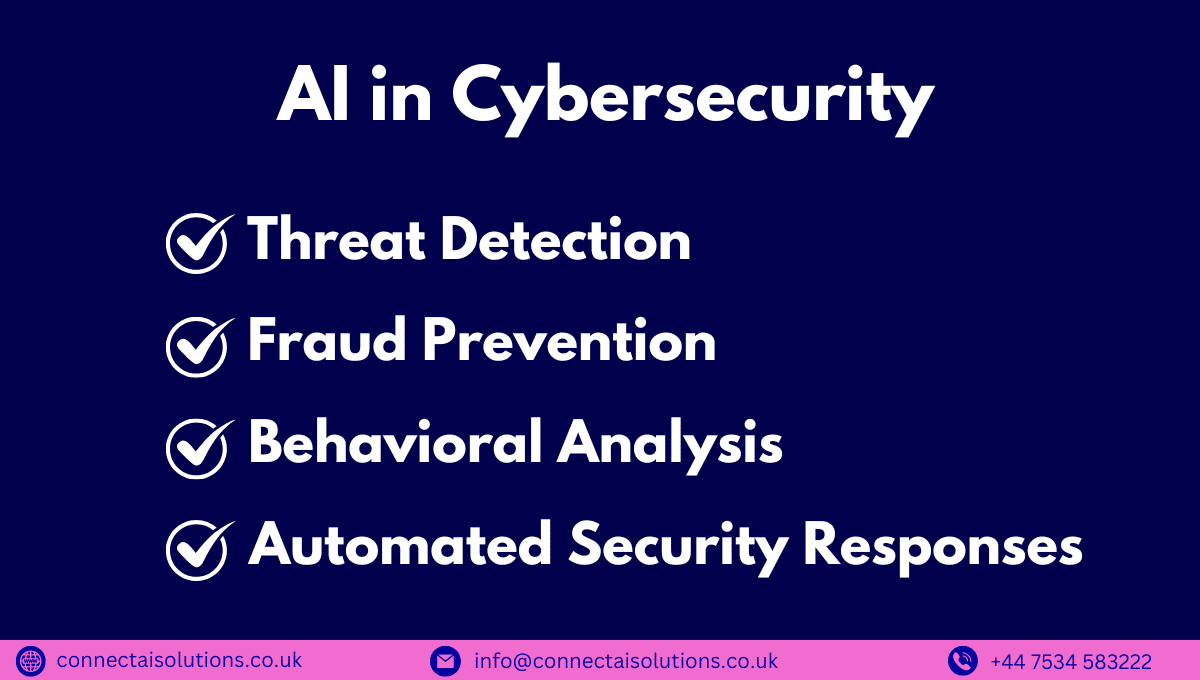
AI strengthens cybersecurity by detecting threats and preventing cyberattacks.
- Threat Detection: The applications of AI help identify anomalies in network traffic, detect malware, and prevent unauthorized access.
- Fraud Prevention: AI analyzes transaction data to detect suspicious activities and prevent financial fraud, making it a vital applications of AI in cybersecurity.
- Behavioral Analysis: The applications of AI monitor user behavior patterns to detect potential security breaches and insider threats.
- Automated Security Responses: AI-driven systems, as part of the applications of AI, respond to cyber threats in real time, mitigating damage and protecting sensitive data.
9. AI in Agriculture

AI enhances agricultural productivity by optimizing resource use and increasing crop yields.
- Precision Farming: AI analyzes soil health, weather data, and crop conditions to optimize irrigation and fertilization.
- Pest Detection: AI-powered drones and sensors detect pests and diseases early, enabling timely interventions.
- Automated Harvesting: AI-driven robots perform harvesting tasks efficiently, reducing labor costs and improving yield quality.
Conclusion
Artificial Intelligence is transforming multiple industries by enhancing efficiency, reducing costs, and improving decision-making processes. As AI technology continues to advance, the applications of AI has expanded from driving innovation and reshaping businesses worldwide. Organizations that embrace AI will gain a competitive edge, while those that ignore it risk being left behind.
Must Read This Article: What Does Generative AI Mean

